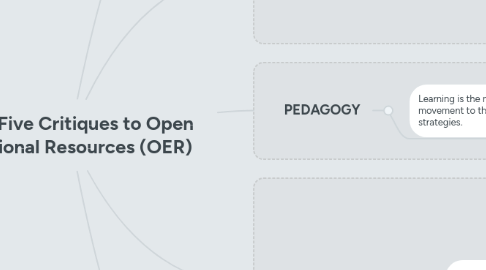
1. FREEDOM
1.1. The OER movement's main concern is to be free from (negative liberty) the institutional barriers to access knowledge.
1.1.1. It overlooks the learning process.
1.2. Berlin (1969)
1.2.1. positive liberty
1.2.1.1. freedom to do something
1.2.1.1.1. Individuals as rational beings decide how to exercise liberty.
1.2.2. negative liberty
1.2.2.1. freedom from something
1.2.2.1.1. The barriers of oppression and intervention are removed.
2. TWO-TIERED SYSTEM
2.1. elitism/inequalities
2.1.1. campus-based alternatives
2.1.1.1. OER are an addition to the university's institutional structures.
2.1.1.1.1. Students have guidance and support from the university.
2.1.2. OER online degrees
2.1.2.1. OER supplement the education of those who cannot join traditional learning settings due to lack of means.
2.1.2.1.1. Students must self-direct.
3. PEDAGOGY
3.1. Learning is the main concern of the OER movement to the detriment of teaching strategies.
3.1.1. Most studies are focused on how to use OER instead of theorising learning.
4. SELF-DIRECTION
4.1. The OER movement assume students will self-direct, but there's an array of external factors associated to this practice.
4.1.1. It's not clear how freedom operates in negative liberty.
4.1.1.1. How can we be sure the outcomes of being free from institutional barriers will achieve predefined goals?
4.1.2. There are subtle notions of power that Berlin's two concepts of liberty fail to consider.
4.1.2.1. Human subjectivity is not pre-existent to the social world. It can be shaped by forms of power and control.
4.1.2.1.1. Individual autonomy is a social construction rather than an innate quality.
4.1.2.2. Foucault's notion of subjectivity (Marshall, 1996)
4.1.2.2.1. "[T]he human subject emerges from structure and organisation". The self and law are not separate identities.
5. MARKETISATION
5.1. In contemporary society, relevant knowledge soon becomes redundant.
5.1.1. The learner is perceived as someone who needs continual learning. They should free themselves from ignorance through autonomous learning.
5.1.1.1. In OER settings, autonomy is linked to institutional policies. Learners have full responsibility for the learning, but institutional control is still strong.
5.2. The language used to advocate for the movement entails marketisation and commodification of higher education.
5.2.1. The self becomes human capital.
